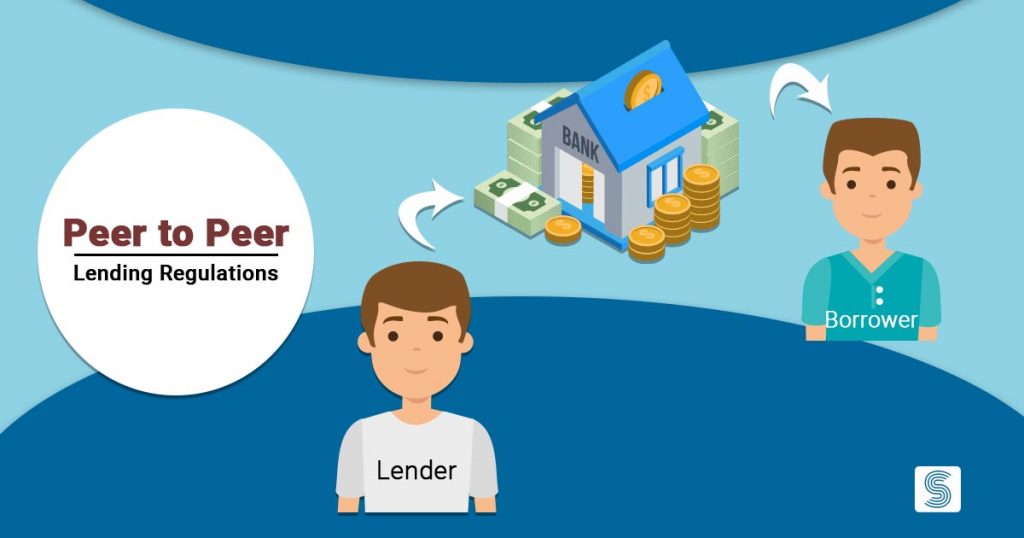Peer to Peer Lending Regulations in India

Dashmeet Kaur | Updated: Dec 20, 2019 | Category: Peer to Peer lending, RBI Advisory
Peer to peer is a lending platform that satiates borrower’s needs by connecting them with suitable lenders. It eliminates the role of any intermediary that charges unnecessary fees from both the parties. Thus, P2P enables a convenient online platform to conduct borrowing and lending activities. Peer to Peer has overthrown all the traditional financial institutes like banks and sustain a strong position in the market. Considering its growing importance, RBI has issued Peer to Peer lending regulations in India that every P2P platform has to enforce.
Table of Contents
Key Characteristics of a P2P Lending Platform
Have a look at the fundamental features of Peer-to-peer lending platforms:
- P2P offers an array of financial services to the borrowers via an online portal.
- In P2P there is no need to form a relationship amid the borrower and the lender to undertake the lending and borrowing process.
- Peer to peer lending companies tends to operate with lower overhead and renders affordable services than banks.
- There is zero involvement of an intermediary or financial institution in the functions of P2P. Thus, it creates a direct deal between the borrower and the lender.
- The lenders get a chance to earn higher returns in contrast to savings and investment products offered by banks. Also, the borrowers get funds at lower interest rates.
- Lastly, P2P gives the leverage to borrowers and lenders to make their choice of borrowings and investments, which fits well to their requirements.
RBI issues Peer to Peer Lending Regulations in India
The Reserve Bank of India releases a new circular on 4th October 2017. As per that circular, all Non-Banking Financial Companies shall regulate the Peer to Peer lending entities that got categorized as (NBFC-P2P). Here is the central Peer to Peer lending regulations that apply to every NBFC-P2P:
- As per the new directions of RBI, no NBFC can commence or start on a Peer to Peer lending platform without procuring a Certificate of Registration.
- Anyone who wants to register with a bank as an NBFC-P2P shall have Net Owned Funds (NOF) of not less than Rs 20 million or such higher amount as may be specified by the bank.
- RBI has also issued some guidelines for the existing Peer-to-platforms. It directs them to apply for registration as NBFC-P2Ps within three months.
- The gazette notification states that all the P2P loan platforms shall be treated as Non-Banking Financial Companies (NBFCs). Further, they will get brought under the ambit of the banking regulator.
- RBI’s restrict the maximum lending/borrowing limit by a single lender or borrower of up to ₹10 lakh. It confines both lenders and borrowers P2P platforms to either lend or borrow more than the prescribed limit.
- Moreover, according to the new Peer to Peer lending regulations, a single lender cannot offer more than ₹50,000 to the same borrower.
- Peer to Peer platform must obtain a certificate from the lender or borrower, to confirm that they have adhered to the prescribed limit.
- The maturity of the P2P loans shall not exceed 36 months.
Scope of NBFC-P2P Activities under the Reserve Bank of India
RBI has framed the functionalities of all the NBFC-P2P entities. The scopes of Peer to peer activities are defined below in Do’s and Don’ts:
Don’ts
- P2P act as an intermediary which provides an online marketplace or platform to its participants (lenders and borrowers);
- Peer to Peer cannot raise deposits under Section 45I(bb) of the Act or the Companies Act, 2013;
- Further, such platforms cannot lend money on its own;
- P2P does not have the right to avail or provide any credit guarantee or credit enhancement;
- Also, as per RBI, NBFC-P2P cannot permit or facilitate any secured lending linked to its platform. Thereby it can only permit clean loans;
- RBI prohibits Peer to Peer from cross-selling any products except for loan specific insurance services & products;
- Moreover, P2P can’t allow the international flow of funds.
Do’s
- All Peer to peer lending companies must undertake due diligence of its participants;
- Also, it requires P2P to conduct risk profiling and credit assessment of the borrowers and unveil the same to their prospective lenders;
- Every P2P requires to have the explicit consent of its participant before accessing their credit information;
- Such platforms shall emphasize on documentation of loan agreements and other inter-related documents;
- Any Peer to peer lending platform must assist in repayments and disbursement of the loan amount;
- NBFC-P2P should store and process all data related to transactions with its lenders and borrowers on hardware located within India.
- A peer to Peer shall ensure adherence to legal requirements as per the participants under relevant laws.
- Lastly, all P2P portals must render loan recovery services which were originated on the platform.
Impact of RBI Regulation on P2P Lending Platforms
RBI’s Peer to Peer lending regulations has revolutionized the operations of P2P platforms. Let’s take a glance on the impact of regulations on P2P:
Revamped P2P Framework on Registration
Until now, the P2P lending entities were recognized by the Companies Act, 2013. However, after RBI directions came into effect, P2P has become a part of NBFCs in India. RBI proclaims that it is mandatory to obtain a Certificate of Registration (CoR) to start the business of NBFC-P2P companies that will serve the public interest. Moreover, only those companies will get access to registration that possess a net owned fund of 20 million or any other higher amount, as specified by the bank.
Tightens the Prudential Requirement
RBI ensures that Peer to Peer platforms shall not expand indiscriminately. Thus, RBI prescribes a leverage ratio of not exceeding 2. In simple words, RBI has restricted the maximum contribution of lenders towards a loan. Therefore, a single lender cannot offer more than Rs 50,000 to the same borrower. Also, there is a cap of Rs 10 lakh as the aggregate exposure of a lender to multiple borrowers, across all P2P platforms.
Legal Accountability
So far, all P2P companies were withholding information of their lenders, borrowers and their businesses as a whole. However, after RBI directions, all P2P platforms must submit reports of their financial positions to the concerned bank on a regular basis. Furthermore, such companies shall also maintain quarterly reports on loans along with complaints which were outstanding or disposed, during that period. In case, a Peer to Peer lending company fails to submit the financial reports; then RBI can impose penalties or even discard the business license.
Improves the Quality of Credit
Earlier, the P2P lending companies do not ascertain the quality of credit. The reason behind that was the credit bureaus don’t have access to all the borrowers, across the country, which results in higher fraud and delinquencies. As soon as, RBI[1] took over P2P, these platforms will get more information about disbursed loans and dishonoured accounts. Thus, it will raise the quality of credit of all P2P lending companies.
Conclusion
Peer to Peer lending regulations is a game-changer for all the P2P platforms. It has brought a positive change in the operation of Peer to Peer companies. RBI monitoring has elevated the reliability of P2P among the public. If you also want to register as an NBFC-P2P company, then you must avail P2P License and consult us. We can easily help you to get through the legal process without much hustle.














